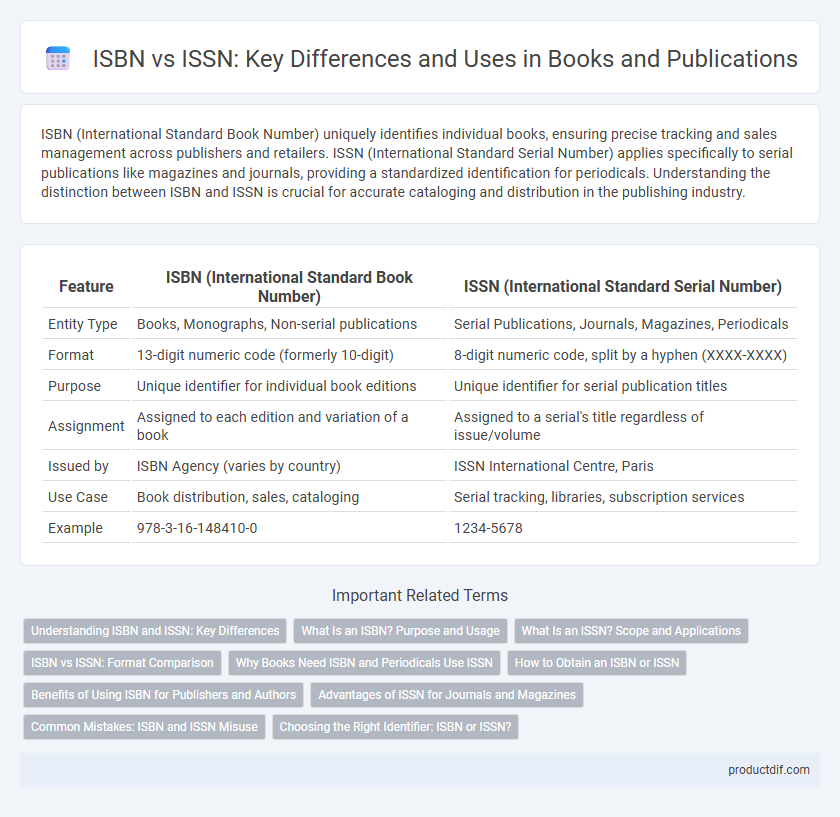ISBN (International Standard Book Number) uniquely identifies individual books, ensuring precise tracking and sales management across publishers and retailers. ISSN (International Standard Serial Number) applies specifically to serial publications like magazines and journals, providing a standardized identification for periodicals. Understanding the distinction between ISBN and ISSN is crucial for accurate cataloging and distribution in the publishing industry.
Table of Comparison
| Feature | ISBN (International Standard Book Number) | ISSN (International Standard Serial Number) |
|---|---|---|
| Entity Type | Books, Monographs, Non-serial publications | Serial Publications, Journals, Magazines, Periodicals |
| Format | 13-digit numeric code (formerly 10-digit) | 8-digit numeric code, split by a hyphen (XXXX-XXXX) |
| Purpose | Unique identifier for individual book editions | Unique identifier for serial publication titles |
| Assignment | Assigned to each edition and variation of a book | Assigned to a serial's title regardless of issue/volume |
| Issued by | ISBN Agency (varies by country) | ISSN International Centre, Paris |
| Use Case | Book distribution, sales, cataloging | Serial tracking, libraries, subscription services |
| Example | 978-3-16-148410-0 | 1234-5678 |
Understanding ISBN and ISSN: Key Differences
ISBN (International Standard Book Number) uniquely identifies books and related printed publications, providing a distinct numeric identifier for each edition and format, typically 13 digits long. ISSN (International Standard Serial Number) is designed for serial publications such as magazines, journals, and periodicals, assigning an eight-digit code to the entire serial title, regardless of individual issue. Understanding these differences is crucial for proper cataloging and efficient management of printed and serial literature in libraries and publishing databases.
What Is an ISBN? Purpose and Usage
An ISBN (International Standard Book Number) is a unique identifier assigned to books for efficient cataloging, ordering, and inventory management in the publishing industry. It ensures precise identification of a specific edition or format of a book, facilitating tracking and sales across bookstores, libraries, and distributors worldwide. The ISBN system helps streamline the supply chain, enhances discoverability, and supports accurate metadata management in digital and physical book markets.
What Is an ISSN? Scope and Applications
An ISSN (International Standard Serial Number) is an eight-digit code used to uniquely identify serial publications such as magazines, journals, and newspapers. Unlike an ISBN, which applies to individual books or monographs, an ISSN covers ongoing series and periodicals, facilitating efficient cataloging and management in libraries and databases. ISSNs are essential in academic publishing and library science for tracking and referencing serials across global platforms.
ISBN vs ISSN: Format Comparison
ISBN and ISSN serve distinct purposes in publishing, with ISBN assigned to books and ISBN format composed of 13 digits divided into five parts identifying the group, publisher, title, and check digit. ISSN applies to serial publications like magazines or journals, featuring an eight-digit format split into two groups of four digits, separated by a hyphen, with the last digit as a check digit. The structural differences in ISBN and ISSN formats reflect their respective uses for individual book titles versus ongoing serial publications.
Why Books Need ISBN and Periodicals Use ISSN
Books require ISBNs because they provide a unique identifier that simplifies cataloging, ordering, and inventory management for publishers and retailers. Periodicals use ISSNs to distinctly identify serial publications across multiple issues and editions, facilitating subscription and library tracking. ISBNs are used for single, standalone titles, while ISSNs are designed for ongoing, continuous publications.
How to Obtain an ISBN or ISSN
To obtain an ISBN, authors or publishers must apply through their national ISBN agency, providing details about the book such as title, author, and format; once registered, a unique 13-digit identifier is assigned. For an ISSN, which is used for serial publications like magazines or journals, organizations must apply to their national ISSN center with information about the serial's title and publishing frequency. Both processes typically require filling out forms and may involve a fee, ensuring each publication is uniquely identified for cataloging and distribution purposes.
Benefits of Using ISBN for Publishers and Authors
ISBNs provide publishers and authors with a unique identifier for each book edition, enhancing discoverability in global book databases and retail systems. This system streamlines inventory management and sales tracking, ensuring accurate royalty distribution and efficient supply chain operations. Using ISBNs boosts credibility and professional recognition, facilitating wider distribution and marketing opportunities across libraries, bookstores, and online platforms.
Advantages of ISSN for Journals and Magazines
ISSN provides a unique, standardized identifier specifically designed for serial publications like journals and magazines, facilitating efficient cataloging and management in libraries and databases. Unlike ISBN, which is assigned per individual book edition, ISSN remains consistent across all issues of a periodical, enhancing seamless tracking and citation. This stability supports better access, distribution, and discoverability in academic and professional publishing environments.
Common Mistakes: ISBN and ISSN Misuse
ISBN (International Standard Book Number) is assigned to individual books or book editions, while ISSN (International Standard Serial Number) identifies serial publications like magazines or journals. Common mistakes include using ISBNs for magazines or ISSNs for standalone books, leading to cataloging errors and distribution confusion. Proper use of ISBN and ISSN ensures accurate identification, efficient inventory management, and correct metadata formatting in publishing.
Choosing the Right Identifier: ISBN or ISSN?
Choosing the right identifier depends on the publication type: ISBN (International Standard Book Number) is assigned to books, including ebooks and audiobooks, whereas ISSN (International Standard Serial Number) is used for periodicals, such as magazines and journals. Publishers must use ISBN for monographs to facilitate distribution and sales tracking, while ISSN supports serial publications by providing a consistent identifier across issues. Understanding these distinctions ensures accurate cataloging and streamlines library indexing and online retail listings.
ISBN vs ISSN Infographic

 productdif.com
productdif.com